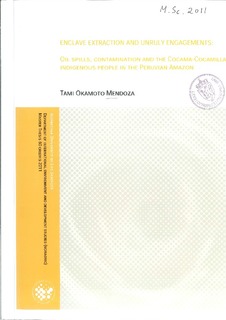| dc.description.abstract | In the Peruvian Amazon, conflicts between the state, indigenous people and oil companies have been on the rise during the last few years. To understand the roots of these conflicts, this study recognizes the need to go beyond „resource curse‟ literature and instead applies new analytical concepts from oil extraction literature in Western Africa. The concept of “enclave” is treated here not only as a spatially-segregated geographic area and an economic domain where large amounts of capital are invested through the oil industry. It also considers private-public partnerships and other social, political and legal issues that are entrenched in its making and that enable the oil industry‟s „disentanglement‟ or detachment from its local surroundings, including the „disentanglement‟ from the environmental contamination (i.e. oil spills) that it generates.
The study also adopts the concept of “unruly engagements” which refers to the unregulated, inflexible, ambiguous and uneven ways in which the state, the oil company and indigenous people relate to each other at the local level (e.g. through meetings, negotiations, compensations). This thesis advances the understanding of such forms of “engagements” at the local level by studying the interactions between the Cocama indigenous people, Pluspetrol, and the Peruvian government in the aftermath of a June 2010 oil spill in the Marañón area of the Peruvian Amazon. The study argues that the mechanisms used in dealing with oil spills are unregulated and highly inefficient in minimizing or preventing social unrest among the affected indigenous communities. Instead, contrary to claims of government authorities and corporate parties, it is both, precisely because and despite of these “unruly” forms of “engagement” that power asymmetries, ambiguous forms of participation and dialogue, and the overall “enclave” form of extraction is reinforced in Amazonia, enabling oil companies like Pluspetrol to effectively disentangle themselves from the social and environmental costs of their actions.
Finally, the study recommends an increasing acknowledgement and respect of the internal decision-making processes of indigenous communities and associations in order to foster meaningful Cocama participation (i.e. better representations of local people‟s perspectives) in the negotiations with state and oil companies and thereby to circumvent further conflicts in Amazonia. | no_NO |
